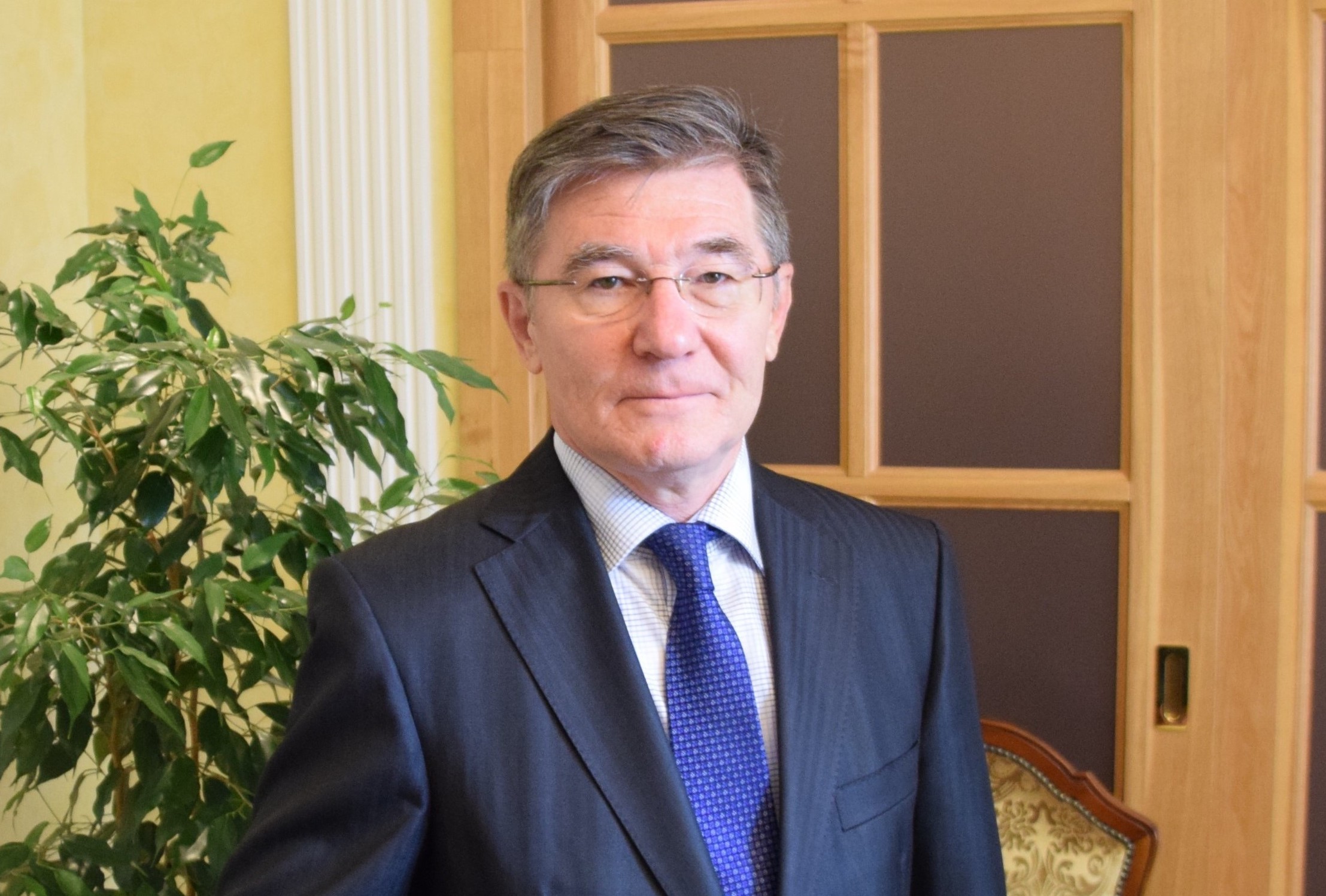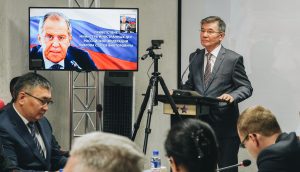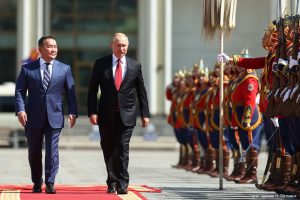Iskander Azizov: Supply of COVID-19 vaccine will not only depend on Russia and Mongolia but also the WHO

Mongolian Economy magazine spoke with Iskander Azizov, Ambassador Extraordinary and Plenipotentiary of the Russian Federation to Mongolia
-Could you tell us about the key projects implemented by Russia and Mongolia at the moment?
-The earliest and most important project is the Russian-Mongolian joint venture, Ulaanbaatar railway JSC (UBTZ), established in 1949. Under the modernization program, two countries are aiming to increase the railway capacity to 54 million tons per year by 2030 (about 30 million tons of cargo is expected to be transported this year). At the present moment, 68 km of tracks have been fixed, and another 80 km will be repaired in the near future. Around 100 km of the 415 km long new railway line from the Tavan Tolgoi coal deposit to Zuunbayan station was built with the participation of UBTZ. In the framework of the agreement between Russian Railways International LLC and UBTZ JSC, Russia has been providing technical consulting services for the construction of bridges and its structure. It is likely that UBTZ will be mainly conducting the feasibility study for the construction of the 280-285 km Zuunbayan-Mandal-Khangi railway which will be utilized for supplying Mongolian coking coal and iron ore to a steel mill in Baotou.
Ural Turbine Plant JSC, part of ROTEC holding, is about to complete the project to upgrade the Ulaanbaatar Power Plant No.4. For instance, on October 2, 2020, the third unit with a capacity of 123 MW was opened. This marked the successful completion of the third stage of the project. As a result, the efficiency of the turbine will increase by nine percent and the service life will be extended for another 40 years.
Currently, negotiations on a promising project to increase the capacity of the capital’s Power Plant No.3 by 250 MW with the participation of INTER RAO – Export is in progress. The project is aimed at introducing modern coal-burning technologies which will reduce its coal consumption by 387,900 tons per year or by 11.6 million tons for the entire life cycle of the plant. This will save money and have a positive impact on the environment in Ulaanbaatar.
As a part of the program of upgrading Mongolia’s agricultural machinery, Mongolia has been receiving machine-building products under the loans provided by the Bank for Development and Foreign Economic Affairs. The second stage of the program for improving the health of Mongolian cattle has been completed. It was partially implemented on a gratuitous basis. There is an opportunity to implement joint projects in space exploration, banking, finance, health, education, communications, IT, as well as in the sphere of peaceful nuclear and other modern technologies.
In 2014, Mongolia proposed the construction of a gas pipeline from Russia to China through the territory of Mongolia which has been under discussion since then. On August 25, 2020, during a video conference, the Chairman of Gazprom PJSC Alexey Miller and Deputy Prime Minister of Mongolia Ya. Sodbaatar signed a Memorandum of Intent regarding the establishment of a special purpose company in Mongolia with the purpose of conducting a feasibility study for the construction and operation of the gas pipeline.
-How is the Embassy of the Russian Federation involved in project implementation? For instance, do you assist Gazprom PJSC in conducting a feasibility study on the construction of the “Power of Siberia-2 gas pipeline”?
-The parties agreed that practical issues should be resolved by implementing companies of the three countries with gas industry specialists who have the necessary expertise in conducting feasibility studies. The Embassy of the Russian Federation provides diplomatic support and facilitates contacts with the Mongolian authorities.
-How can Mongolia diversify its exports to Russia? Which Mongolian products or raw materials have a growth potential in Russia?
-Companies solely focused on the Russian market could be set up in Mongolia. Given that Russia is a member of the Eurasian Economic Union which has common technical and phytosanitary requirements, what is exported to Russia can be exported to the markets of other EAEU member states. For example, Mongolia and Russia have been having talks on building a joint meat processing and production plant with companies from Irkutsk. We are also interested in importing Mongolian leather.
In addition, the EAEU provides discounts for goods originating from developing countries which amounts to 25 percent of import customs duties. This means Mongolian companies could receive preferential treatment when exporting various types of minerals such as iron, copper, gold, molybdenum, silver, tungsten, tin, lead, zinc, uranium and rare earth metals.
It is also possible to create joint production facilities for their processing. In order to enter the markets of the EAEU member states, gain consumer confidence and re-invigorate the “Made in Mongolia” brand, the product standards and quality need to be improved. This is another promising and important area in our bilateral cooperation.
-What are the common obstacles faced by Russian companies in entering the Mongolian market, and vise versa?
-According to our observations, there are practically no special impediments. With our Mongolian colleagues, we try to keep up with modern requirements to create favorable business conditions for companies in the two countries.
Of course, there are some issues that need to be addressed. For example, Mongolian entrepreneurs are anxious about custom duties, but as I mentioned before, there is a preferential treatment that your businesses do not take full advantage of. We are quite concerned about flour import quotas to Mongolia as it is not fully compatible with the rules and regulations of the WTO. During the “Discover Mongolia-2020” forum, the delegates pointed out contradictions between the provisions of laws and their implementation.
-What action or measure should be taken to expand the scope of the relations between Mongolia and Russia? Should the countries focus on cooperation in a particular sector, let’s say energy?
-Focusing on a particular sector means deliberately narrowing the scope of bilateral cooperation. Energy, of course, is one of the most important and promising elements of our cooperation. For example, Russian companies could undertake the project of constructing a thermal power plant based on the Tavan Tolgoi coal deposit and designed to supply electricity and heat to projects implemented in the Gobi region. We could also continue to contribute to the modernization of energy facilities in your country.
It is important for your country to facilitate international air travel, especially taking into account the prospects for further development of tourism. A discussion on the creation of a joint venture between Rosneft Oil Company PJSC and its Mongolian partners is underway. This joint venture could provide fuel for airplanes and operate a refueling facility at the new international airport. Unfortunately, the Rosneft Aero delegations have been unable to come to Ulaanbaatar due to the restrictions imposed in January in connection with the spread of COVID-19. Hence, this process has been halted for an uncertain time.
I would like to note that Rosneft Oil Company PJSC has extensive experience in servicing refueling facilities both in Russia and Mongolia. At the same time, Rosneft not only does business but also pays great attention to our common history. The company made a donation worth eight million euros in building a new administrative center at Khalkhin Gol Soum of Dornod Aimag in Mongolia to mark the 80th anniversary of our mutual victory on the Khalkhin Gol River.

Recently, Russian-Mongolian cooperation in the mining industry has intensified. A cooperation agreement was signed between Russian Zarubezhgeologiya JSC and the Mongolian state-owned enterprise Erdenet Mining Corporation SOE in the field of geological-geophysical and engineering-geological research. Furthermore, an agreement was signed between Rosgeologia JSC and the Mineral Resources and Petroleum Authority to conduct geological research of the Mongolian subsurface. The aforementioned agreements are expected to be implemented in the near future. There are other areas for further cooperation such as information technology, space, agriculture, medicine, nuclear technology, and education.
-Has COVID-19 affected the relationship between the two countries
-It did not have any fundamental effect. However, in many ways, work plans were halted but we are able to overcome them with the help of our Mongolian colleagues. The current advanced technologies are making communication between the two countries possible.
On the other hand, the frequency of communication between the countries has inevitably decreased due to the pandemic. It is indeed slowing down processes such as discussing our common agendas and solving current issues. Due to the lower business activities, trade and economic relations are suffering. According to the Trade Statistics issued by the Customs Office of Mongolia, in the first nine months of 2020, bilateral trade reached 1.07 billion USD. To break it down, exports to Russia amounted to 36.7 million USD and imports to 1.03 billion USD. Compared to the same period in 2019, the trade turnover decreased by 21 percent, in particular, exports by 30 percent and imports by 20 percent.
-In Russia, around 2000 front-line personnel have been administered the Sputnik-V vaccine since August. Some Western health experts have warned that Russia and China are moving too fast before the vaccines’ side effects and efficiency can be properly ascertained. Do you agree with the Western health experts?
-In Russia, epidemiology, science and healthcare industries are, in fact, well developed. On August 11, 2020, Sputnik-V manufactured by the Federal Research Centre for Epidemiology and Microbiology named after the honorary academician N.F. Gamaleya received a certificate of registration from the Russian Ministry of Health, becoming the first registered COVID-19 vaccine in the world. On October 27, the Russian Direct Investment Fund sent applications to the WHO for the accelerated registration procedure (Emergency Use Listing, EUL) and prequalification of the drug (assessment of the quality, safety and effectiveness of its medicinal properties). If the vaccine meets the established requirements and standards of the WHO, the simplified protocol will make the Russian vaccine available to the rest of the world within a short time.
We have no reason to question the achievements of our scientists whose competencies have long been proven in practice. A member of the Russian Academy of Sciences, virologist Fyodor Ershov notes that the vaccine developed by Gamaleya Research Centre was created using modern biotechnology and proven methods whereas vaccines developed by other companies are based on mRNA or monkey adenovirus whose efficiency has not been proven.
If you ask why the Sputnik-V vaccine is safe, it is because the vaccine contains a cold virus that is harmless to humans, does not contain the coronavirus per se and only part of its genetic code which eliminates the possibility of infection. As a matter of fact, the clinical trials on Sputnik-V confirmed the production of antibodies necessary to protect the body from coronavirus.
On September 4, the results of the 1st and 2nd phases of the Sputnik-V vaccine were published in the leading medical journal “The Lancet”. It showed that the vaccine sustained humoral and cellular immune response among all volunteers without causing any serious adverse effects. A post-registration study (the 3rd phase of clinical trials) is underway with the participation of 40,000 volunteers in Russia, Belarus, Venezuela, and the United Arab Emirates. The first results are expected to be published in November. In September, India agreed to carry the 2nd and 3rd phases of controlled clinical trials of the Sputnik-V vaccine in its territory. The State Research Center of Virology and Biotechnology VECTOR (Novosibirsk) has developed another vaccine called “EpiVacCorona”.
-Russia might offer fast-tracked shots of COVID-19 vaccines to poor nations. Have Russia and Mongolia signed a deal on the COVID-19 vaccine supply? When do you think Mongolia will receive a vaccine from Russia?
-To date, more than 50 countries in the Middle East, Asia, Latin America, Europe and the CIS have submitted applications to the Russian Direct Investment Fund for the purchase of the vaccine. The Fund reached an agreement to supply the vaccine to Mexico (32 million doses), Brazil (up to 50 million doses), India (100 million doses), Uzbekistan (up to 35 million doses), Nepal (25 million doses, i.e. 90% of the population) and Egypt (25 million doses, i.e. 25% of the population).
According to your national legislation, only vaccines that have approval from the WHO are allowed to be used in Mongolia. Our Mongolian partners received all the necessary information from the Russian Direct Investment Fund and also determined the required amount of vaccines. Further progress on vaccine supply will not only depend on Russia and Mongolia but also on the WHO.
-Are there prospects of opening borders between the two countries in the near future?
-Everything will depend on the COVID-19 pandemic situation. As far as we know, the Government of Mongolia takes a stance to open the borders only after receiving effective COVID-19 vaccines.
-What is the Embassy of the Russian Federation planning in the anticipation of the 100th anniversary of the establishment of diplomatic relations with Mongolia?

-On November 5, 2021, our countries will celebrate the 100th anniversary of the establishment of diplomatic relations. At the moment, the representatives of the two countries are finalizing their plan regarding the 100th anniversary.
For sure, a lot will depend on the COVID-19 pandemic. We hope that we will be able to hold a number of high-level meetings, organize large-scale joint trade and economic forums, historical, archival and art exhibitions and performances by leading artists.
-It has been over seven years since you were appointed as the Ambassador of the Russian Federation to Mongolia. What do you think is unique about Mongolia?
-Mongolia cannot leave anyone indifferent. It has various unique traits which stem from past nomadic lifestyle. Moreover, it is a country that has a hint of European traditions from the Soviet period. One of the most unique features is a blend of traditional and modern culture.
-What do you want people to know about the Embassy of the Russian Federation?
-Every employee of the Embassy of the Russian Federation is truly committed to strengthening the friendship and comprehensive partnership between Russia and Mongolia. Our diplomats treat Mongolia, its language, culture and customs with respect and interest.
The Russian Centre for Science and Culture in Ulaanbaatar works directly with Mongolian citizens on humanitarian matters such as language, education and culture. The Trade Representation of the Russian Federation is engaged in particular trade and economic initiatives.